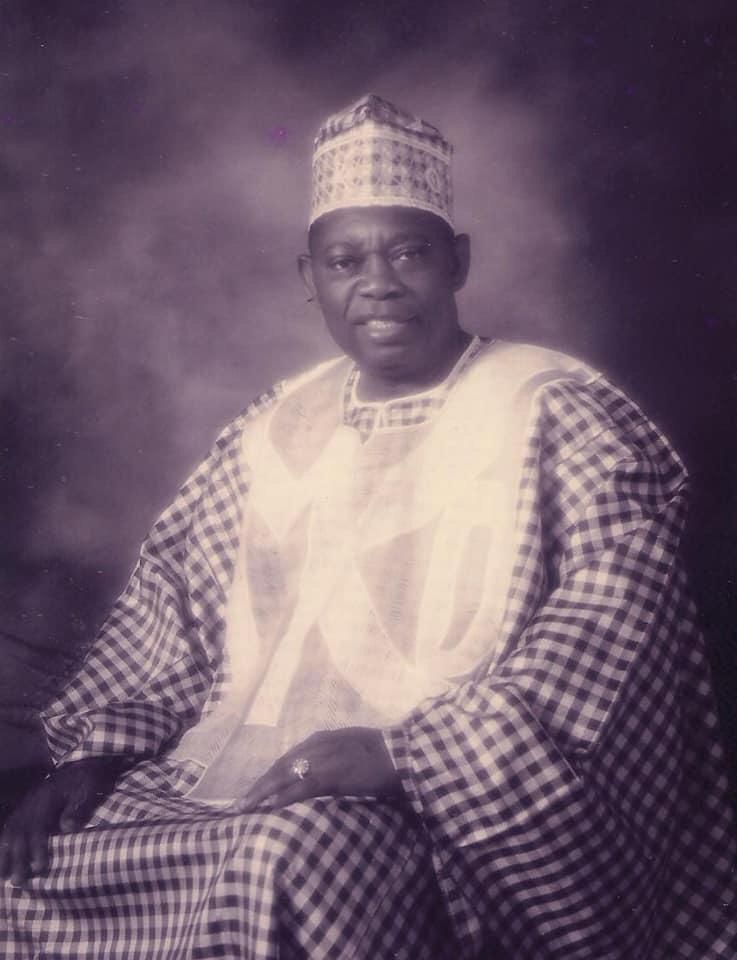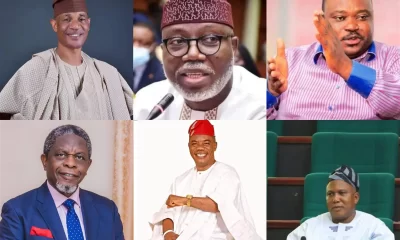Comments and Issues
Reparation the solution to Africa’s debt burden
Published
8 months agoon
By
Olu Emmanuel
By Richard Odusanya and Co-contributor Dr Adebisi Abiola
Let’s begin with a quotation from Walter Anthony Rodney, a Guyanese historian, political activist, and academic. His notable works include “How Europe Underdeveloped Africa,” first published in 1972. Rodney was assassinated in Georgetown, Guyana, in 1980. Rodney, famously posited: “There is a perennial debt to be paid to black people for continuing enslavement and degradation. There are those who believe that the matter is over. They are completely wrong. Actually, there are those among us who believe that the demand and struggle for justice and restoration to full dignity would take a generation to win a crusade for reparations – in unison under concerted strategy.”
It is instructive to note that, slavery is a crime against humanity and its damaging impact continues to be felt across the world today. For those who do not know, this contribution that focuses on “Reparation Amidst Africa’s debt burden” will refresh our memories. Find below a brief history of “Reparation for Africa” as championed by one of the finest African and a Pan-Africanist Par-Excellence Bashorun Moshood Kashimawo Olawale Abiola GCFR:
Regrettably, the movement for reparations originated in the Organization of African Unity (OAU), now succeeded by the African Union (AU). At a meeting in Abuja, Nigeria on 28 June 1992, the OAU swore in a 12-member Group of Eminent Persons. The Group’s mandate was to pursue the goal of reparations to Africa. The original Chair of the Group was the pillar of sport in Africa, a Pan-Africanist, Bashorun Moshood Kashimawo Olawale Abiola, (GCFR), who was later elected President of Nigeria, although was denied the privilege of office as the President C-in-C of the federal republic of Nigeria.
Painfully, other members were the Nigerian historian J. F. Ade Ajayi; Professor Samir Amin of Egypt; US Congressman R. Dellums; Professor Josef Ki-Zerbo of Burkina Faso; Mme Gracha Machel, formerly First Lady of Mozambique, and a political activist in her own right (and later the wife of Nelson Mandela); Miriam Makeba, the South African singer; the Kenyan social scientist Ali Mazrui (based in the United States); Professor M. M’Bow, former Director-General of UNESCO; former President A. Pereira of Cape Verde; Ambassador Alex Quaison-Sackey, former foreign minister in the government of Kwame Nkrumah of Ghana; and the Jamaican lawyer and diplomat Dudley S. Thompson.
It is not clear whether all 12 individuals were present at Abuja, or indeed if all were aware of their new role. As of December 2002, three members of the group were still actively pursuing reparations, mainly through their writings and lectures at academic conferences and institutions. They were J. F. Ajayi, Ali Mazrui, and Dudley Thompson. According to Thompson, they still filed annual reports to the OAU/AU, although yours truly the writer of this contribution has not been able to locate any such reports. According to Mazrui, there was very little contact among members of the Group, who acted in their individual capacities rather than as a collective.
The Group of Eminent Persons (GEP) was established at the suggestion of M. K. O. Abiola. MKO had apparently been influenced to take up this cause both by a chance discussion of the Holocaust with a Jewish businessman and by his contacts with the Congressional Black Caucus in the United States. In a speech delivered in London in 1992, Abiola said: “Our demand for reparations is based on the tripod of MORAL, HISTORIC, and LEGAL arguments… Who knows what path Africa’s social development would have taken if our great centers of civilization had not been razed in search of human cargo? Who knows how our economies would have developed…?” Bashorun Abiola in the year (1992), went on to argue that international law applied (retroactively) to slavery, the slave trade, and colonialism. “It is international law which compels Nigeria to pay her debts to western banks and financial institutions: it is international law which must now demand that the western nations pay us what they have owed us for six centuries.”
The then-President of Nigeria, General Ibrahim. B. Babangida (IBB), promoted the idea of reparations and officially dedicated US$500,000 to it (although the Group apparently received these funds from MKO’s private purse, not from the Government of Nigeria). Babangida had discussed the idea of reparations as early as 1991 with the then presidents of Senegal and Togo, the three agreed that the African debt “should be written off as part of the reparations due for 500 years of slavery of Africans in Western Europe and America”
“Pan-African Conference on Reparations” was held in Abuja, Nigeria, sponsored by the GEP and the Commission for Reparations of the Organization of African Unity (Mazrui 2002: 135). An official Proclamation was issued at this Conference. This Proclamation referred to the “moral debt” and “the debt of compensation” owed to Africa by countries that engaged in slavery, colonialism, and neo-colonialism. It also called for the return of “stolen goods, artifacts, and other traditional treasures”. For instance, such as the campaign by the African Reparations Movement in Britain to have the Benin bronzes presently housed in the British Museum returned to Africa. Compensation was envisaged in the form of “capital transfer and debt cancellation”, as well as in a re-ordering of international relations to give Africa more representation in the “highest decision-making bodies” and, in particular, a permanent seat on the United Nations Security Council.
It is against this backdrop, that, developments and events of the past few days locally and internationally become very clear that “Reparation for Africa” is a just course as evidenced by the action and historically significant role of John Gladstone, one of the largest slave owners in the British West Indies. But fast forward to Friday 25 August 2023 at the University of Guyana, the family of former British Prime Minister William Gladstone appologized for their family’s slave owning past in Guyana as descendants of slaves have sought for reparations. Charles Gladstone, the great-great-great-grandson of John, who spoke at the event said “Slavery was a crime against humanity and its damaging impact continues to be felt across the world today.”
Furthermore, “we believe that his (John) actions amounted to a crime against humanity and wish to apologize to the people of Guyana. We know that we can’t change the past, but we believe that we can make a better future. Guyana for us isn’t just about money though. It is about acknowledging that slavery still has a massive impact on many people’s health and wider socio-economic status across the world.” Therefore, the Gladstone family called on the UK government to begin “reparative justice” by apologizing for slavery within the British Empire Empire. And besides an apology, the Carribean Community and Common Market (CARICOM) recommended reparation for descendants of “stolen people” and debt cancellation to clean up the “colonial mess.”
And on a similar note, Richard Odusanya in a recent article titled “Niger Republique: From Constitution to Constipation,” wrote in the concluding paragraph that “it is important to honor the memory of Bashorun Moshood Kashimawo Olawale Abiola (MKO), the progenitor of REPARATION for Africa’ by making a demand for restitution from the big world. With profound respect and a very high sense of responsibility; I, therefore, wish to state that a definite time and amount of not less than five trillion dollars be placed as a demand for restitution. Additionally, the revitalization of NEPAD is expected to focus on REPARATION, so as to reduce the burden of our debt profile. Finally, this is an opportunity for President Bola Tinubu, the ECOWAS chairman to demonstrate the spirit of Pan-Africanism, take the lead, and be passionate and committed to Africa’s emancipation as exemplified by ‘MKO’ the pillar of sport in Africa.”
Lastly, the import and significance of President Bola Tinubu’s core message in his address to the NIGERIA BAR ASSOCIATION (NBA) at the ongoing conference in the capital city of Abuja underscore the real essence of “Reparation for Africa”. President Bola Tinubu profoundly posited: “Can we continue to service external debts with 90% of our revenue? It is a path to destruction. It is not sustainable.” In view of this, we need to revisit and reactivate the noble reparation idea of MKO Abiola GCFR. This is the only way out of our choking debt. After all, the African continent deserves full compensation for the trauma and setback effect of slavery and the Western exploitative tendencies typically characterized by neo-colonialism. Hence, Africans on the continent and in the diaspora should continue to make spirited demands for reparations on the premise of human rights violation, degradation and exploitation.
Richard Odusanya and co-contributor Dr Adebisi Abiola
Trending

 Health & Fitness3 days ago
Health & Fitness3 days agoMalaria Vaccines in Africa: Pastor Chris Oyakhilome and the BBC Attack

 Featured1 week ago
Featured1 week agoPolice reportedly detain Yahaya Bello’s ADC, other security details

 Aviation5 days ago
Aviation5 days agoWhy some airlines are avoiding Nigeria’s airspace–NAMA

 Business1 week ago
Business1 week agoMaida, university dons hail Ibietan’s book on cyber politics

 Business1 week ago
Business1 week agoDebt servicing gulps 56% of Nigeria’s tax revenue, says IMF

 Aviation4 days ago
Aviation4 days agoJust in: Dana airline crash lands in Lagos

 Aviation4 days ago
Aviation4 days agoNSIB begins investigation into Dana Air after crash-landing incident

 News7 days ago
News7 days agoOndo APC guber hopefuls reject primary poll

